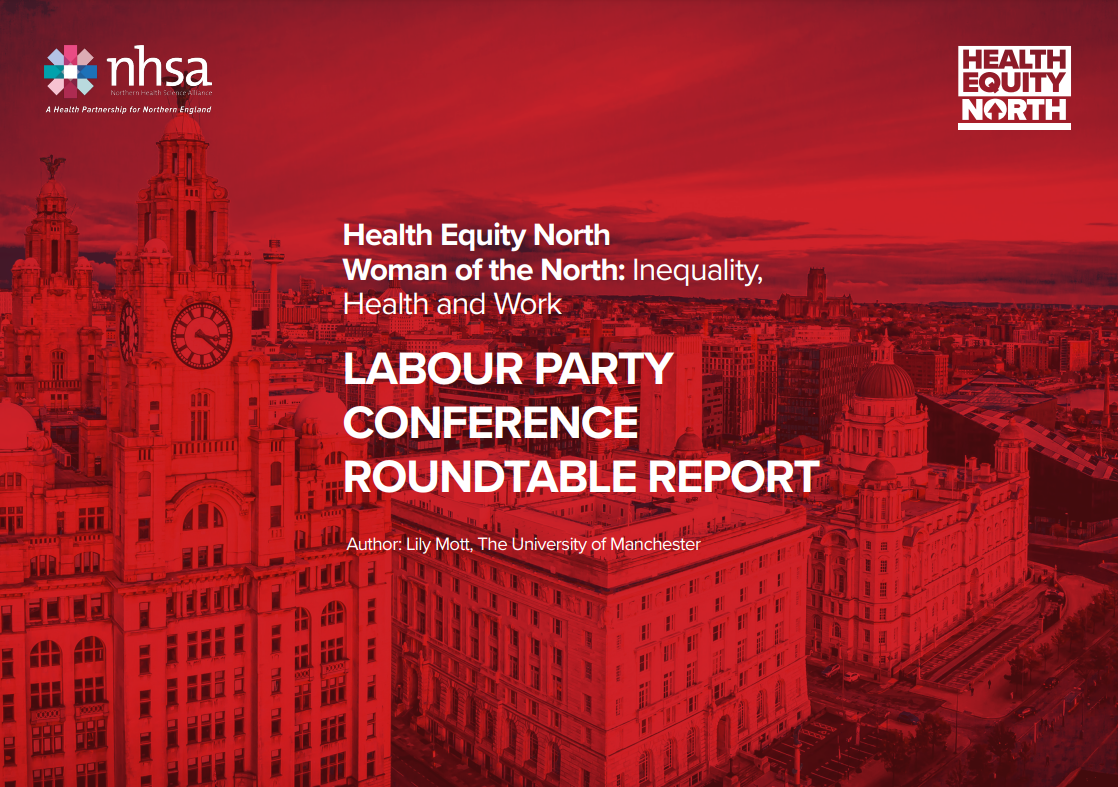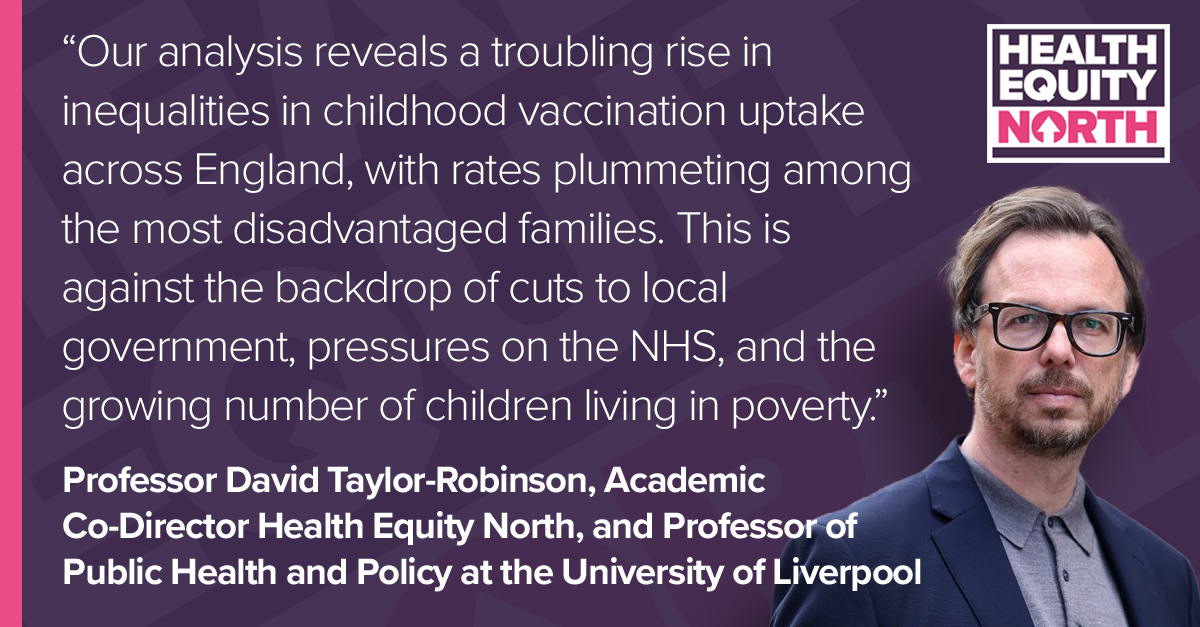Addressing Health Inequalities: The Missing Pieces in Party Manifestos

The Manifestos
The three main parties have now launched their election manifestos ahead of polling day on 4 July 2024.
Through each manifesto there has been a nod to tackling health inequalities with increased funding for the NHS, recruiting more health visitors and expanding mental health services – but what was absent from each manifesto was a clear child poverty reduction strategy and changes to benefits and housing which would improve the wider determinants of health.
Health inequalities in the country are increasing, adversely affecting physical and mental health while also contributing to declining productivity. Our research shows that elevating the North’s health to match the rest of the country could inject £13.2 billion into the economy.
In the North of England, as inequality continues to grow, our research demonstrates that by tackling the wider determinants of health we can significantly reduce health disparities in our region and improve the health and wealth of the entire nation.
So, what did each manifesto have to offer and what impact would this have on health inequalities across the North?
The Labour Party set out five national missions that formed the basis of their manifesto that was published yesterday.
Their fifth mission in government will be to break down the barriers to opportunity for every child, at every stage and shatter the class ceiling. Stating they will
- Create a modern childcare system with breakfast clubs in every primary school to give children the best start to the day
- Make sure there’s a world class teacher in every classroom, recruiting 6,500 new staff, paid for by ending tax breaks for private schools.
- Support every family by training thousands more health visitors, to reduce inequalities, promote health and wellbeing, and ensure families have the resilience, attachment and support they need to grow together.
- Bring down waiting times for mental health treatment for everyone who needs it, through recruiting thousands more mental health professionals and providing an open access hub for young people in every community to ensure early intervention is available to all.
All of the above does go some way to improving health inequalities but it was a shame not to see a child poverty reduction strategy in the manifesto focusing on changes to benefits, scrapping the two-child limit and uprating benefits – especially when the country is desperate for an overarching plan which brings together policies to support children and families.
The Conservative Party Manifesto
The Levelling Up initiative was seen as vital to address the entrenched inequalities between the North and South of England. The Conservative manifesto references Levelling Up several times with a focus on further funding pots for local projects, support for new businesses, and the creation of high-quality jobs. However, in the years since the Department for Levelling Up, Housing and Communities was established there has been ongoing scepticism around the impact of the levelling up agenda and whether these commitments will translate into tangible benefits for the North, especially in light of historical underinvestment.
There are detailed plans to bring health and social care closer to patients by:
- Expand Pharmacy First, including for menopause support, contraception and treatment for chest infections, freeing up 20 million GP appointments a year.
- Build or modernise 250 GP surgeries, focused on areas of new housing growth.
- Build 50 more Community Diagnostic Centres, including in underserved areas, resulting in an additional 2.5 million checks a year.
We welcome the plans to make Women’s health a priority following the publication of the first Women’s Health Strategy in 2022 and plans for Mental Health Support Teams in 100% of schools and colleges in England by 2030.
On childcare, the Conservative Party have stated that from September 2025, all eligible parents with children from age nine months up to when they start school, will be able to access 30 hours of free childcare a week. Once the roll out is completed, families will save an average of £6,900 per year. They are also promising a Family Hub in every local authority in England and to create more places in children’s homes while prioritising keeping families together where that’s best for the child.
With regards to welfare and work it’s disappointing that there is not a focus on uprating benefits in line with inflation, increasing the living wage or scrapping the two child limit, instead plans are to:
- Reform disability benefits so they are better targeted and reflect people’s genuine needs, while delivering a step-change in mental health provision.
- Improve PIP assessments to provide a more objective consideration of people’s needs and stop the number of claims from rising unsustainably.
- Tighten up how the benefits system assesses capability for work.
- Accelerate the rollout of Universal Credit to ensure it always pays to work.
While the Conservative manifesto outlines plans for increasing capacity in heath and social care and focuses on women’s health and mental health, it largely overlooks the broader social determinants of health, such as housing, education, and welfare – which are crucial for addressing health inequalities. The lack of reversal of cuts to social security and the lack of a child poverty plan are major gaps in their manifesto.
The Liberal Democrat Party Manifesto
The Liberal Democrats have an extensive plan for health services, giving everyone the right to see a GP or the most appropriate practice staff member within seven days, increasing the number of full-time equivalent GPs by 8,000 and freeing up GPs’ time by giving more prescribing rights and public health advisory services to qualified pharmacists, nurse practitioners and paramedics.
There are plans to improve early access to mental health services by opening walk-in hubs for children and young people in every community and offering regular mental health check-ups.
Interestingly, they are the only party to highlight healthy life expectancy in their manifesto, stating that they want to help people spend more years of their life in good health and will do this by increasing the Public Health Grant and establishing a ‘Health Creation Unit’. This would sit within the Cabinet Office to lead work across government to improve the nation’s health and tackle health inequalities.
A commitment to a health in all policies approach across government is welcomed and this is a policy Health Equity North has been championing. The focus on health services and mental health is good news and we hope funding for extra and expanded services would be targeted at the places that need it most.
The manifesto also focuses on the wider determinants of health, stating that:
“We will invest in improving public health, expanding early access to health services, and fixing social care. We will give every child the support they need with more specialist teachers, free school meals for all children in poverty, and a dedicated mental health professional in every school. We will repair the broken safety net that currently consigns so many to poverty.”
It was heartening to see a commitment to increasing the carer’s allowance and expanding its eligibility. Many carers are currently struggling financially so raising the amount they can earn is a crucial step towards providing them with the support they need and deserve.
And we were delighted to see a commitment to abolish the two-child benefit cap something Health Equity North has called for, along with plans to reduce the wait for the first payment of Universal Credit from five weeks to five days, scrapping the bedroom tax and expanding access to childcare. However, we would have liked to have seen a defined strategy for tackling child poverty and supporting vulnerable children and families.
In conclusion, while all three major parties recognize the need to tackle health inequalities, they each miss some key points. Labour’s focus on childcare, education, and mental health is promising but lacks a clear plan to reduce child poverty. The Conservatives emphasize increasing healthcare capacity and women’s health but don’t address crucial factors like housing and welfare. The Liberal Democrats offer a more well-rounded approach, targeting public health and broader social issues, but still fall short on a solid strategy for tackling child poverty.
To effectively address health inequalities, any governing party needs to look at the bigger picture, covering both healthcare needs and wider social issues like housing, education, and welfare support. The lack of a strong child poverty reduction plan in all manifestos is a major oversight that needs attention to improve health and fairness across the country, especially in areas like the North of England.
Missing Pieces
All three major parties have acknowledged the importance of addressing health inequalities in their manifestos, and they do fall short in some critical areas.
The Labour Party’s proposals to improve childcare, education, and mental health services show a commitment to breaking down barriers to opportunity as they say, but there is a gaping hole where a child poverty reduction strategy should be. The party has stated that if elected they would not scrap the two child cap and have been hesitant on the issue of free school meals preferring to champion breakfast clubs. We hope that if the Labour Party do form the next government that they feel emboldened to go further on child poverty policy.
The Conservative Party’s manifesto emphasises healthcare capacity and women’s health but overlooks broader social determinants like housing and welfare, essential for addressing health disparities. It was disappointed to see measures on welfare focus on keeping claims down rather than supporting people through uprating benefits in line with inflation and scrapping the two child limit.
The Liberal Democrats present a more comprehensive approach, with a focus on public health, mental health services, and increasing carer’s allowance. While they do offer a plan to tackle the wider determinants of health it was a shame not to see a concrete plan for reducing child poverty.
To effectively address health inequalities, any governing party must adopt a comprehensive approach that encompasses both healthcare needs and broader social determinants such as welfare support, housing, and education. The absence of a robust child poverty reduction strategy in all the manifestos represents a significant omission – a plan is desperately needed to support struggling children and families and to boost health and equity across the nation, particularly in areas such as the North of England.






